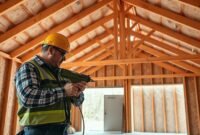Does insulation help to reduce sound? Beyond its primary role in thermal regulation, insulation, particularly soundproof insulation, effectively reduces noise pollution.
It plays a crucial role in absorbing sound transmission, including airborne noises, through walls and ceilings in a building, enhancing the acoustic comfort of the space.
This article will explore how insulation can help with sound since sound can be a significant issue in many homes and buildings. We will also discuss the best insulation materials and how it work.
Does Insulation Help With Sound?
Yes, soundproof insulation can significantly enhance the comfort and tranquility of your living space by minimizing the transfer of sound waves, including airborne noises, through a building’s walls, floors, and ceilings.
Sound waves can penetrate most materials, making effective insulation crucial for noise reduction as they travel through the air.

If your home isn’t adequately insulated with soundproof materials, you may experience increased noise intrusion from outside sources such as traffic, neighbors, and other disturbances.
Soundproof insulation is designed to absorb and dampen these sound waves, particularly airborne noises, effectively reducing the noise permeating your home’s barriers.
Best Insulation to Reduce Noise
When it comes to reducing noise, choosing the proper insulation is crucial since each material has different sound insulation methods or principles. Here are the best insulation materials to consider:
● Mineral Wool
Mineral or rock wool is insulation made from natural or synthetic materials like rock or slag. This is a great option to reduce noise as it is dense and has excellent sound-absorbing abilities. It can also fit into small spaces, which makes it a flexible choice for soundproofing walls and ceilings.
Read also: What is Cellulose Insulation Made of?
● Fiberglass
Fiberglass insulation, known for its soundproofing capabilities, is a popular and cost-effective choice. Comprising small glass fibers, it is lightweight and straightforward to install, making it an ideal solution for reducing airborne noises.
It is widely available at home improvement stores and can be used on various building components for effective noise control.
● Blown-in Cellulose
Next is blown-in cellulose, a material made from recycled paper or cardboard treated with chemicals to resist fire and pests. It’s an excellent option for reducing noise because it’s dense and fills gaps and cavities nicely.
● Spray Foam Insulation
Spray foam insulation is made from a chemical mixture that expands when applied. This is a great way to reduce noise, creating a tight seal that fills all gaps and cracks. Spray foam insulation also effectively reduces air leaks and can be used in walls, ceilings, and floors.
● Foam Board
Lastly, you can use a foam board. It is made from rigid foam panels that you can trim to fit into walls, floors, and ceilings. This is an excellent choice for reducing noise as it is dense and can create a tight seal. Foam board insulation can also be used to soundproof doors and windows.
Read also: Best Adhesive for Foam Board to Concrete
Overall, each of these insulation types has unique benefits in reducing noise. The best option for you will depend on your specific needs and the location you plan to insulate. It’s also essential to consider factors like cost and ease of installation.
How Does Sound Insulation Work
To understand how sound insulation works, we first need to understand the science of sound. A sound is a form of energy that travels in waves through a medium, such as air or a solid object.
When a sound wave encounters an object, it can be transmitted, absorbed, reflected, or diffracted. Meanwhile, sound insulation reduces the transfer of sound waves between spaces by limiting their ability to travel through a material.
Various insulation materials can also absorb different frequencies of sound waves. For example, fiberglass insulation absorbs high-pitched sounds well, while mineral wool is better at absorbing low-pitched sounds.
So, does insulation help with sound? Absolutely. Proper soundproof insulation is vital for creating a comfortable and serene living environment. By choosing the right type of insulation and employing effective soundproofing techniques, you can significantly reduce airborne noises and enhance the acoustic quality of your living space.


